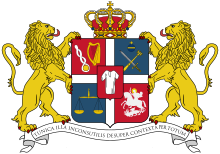Georgian Bagratids
| Bagrationi ბაგრატიონი |
|
|---|---|
 Coat of Arms |
|
| Country | Georgia |
| Titles |
|
| Founded | c. 780 |
| Final ruler | George XII and Solomon II |
| Current head |
Prince Nugzar Bagrationi (disputed) Prince David Bagrationi (disputed) |
| Deposition | 1801/1810 |
| Ethnicity | Georgian |
| Cadet branches | House of Mukhrani |
The Bagrationi dynasty (Georgian: ბაგრატიონი [bɑɡrɑtʼiɔni]) is a royal family that reigned in Georgia from the Middle Ages until the early 19th century, being among the oldest extant Christian ruling dynasties in the world. In modern usage, this royal line is often referred to as the Georgian Bagratids (a Hellenized form of their dynastic name), also known in English as the Bagrations.
The common origin with the Armenian Bagratuni dynasty has been accepted by scholars. The family, in the person of Ashot I, the great-grandson of the presiding prince of Armenia Ashot III Bagratuni, gained the principate of Iberia at the end of the 8th century. His descendants restored, in 888, the Georgian monarchy and united various native polities into the Kingdom of Georgia, which prospered from the 11th to the 13th century. This period of time, particularly the reigns of David IV the Builder (1089–1125) and his great granddaughter Tamar the Great (1184–1213), is celebrated as a Golden Age in the history of Georgia.
After fragmentation of the unified Kingdom of Georgia in the late 15th century, the branches of the Bagrationi dynasty ruled the three breakaway Georgian kingdoms, Kingdom of Kartli, Kingdom of Kakheti, and Kingdom of Imereti, until Russian annexation in the early 19th century. While the Treaty of Georgievsk's 3rd Article guaranteed continued sovereignty for the Bagrationi dynasty and their continued presence on the Georgian Throne, the Russian Imperial Crown later broke the terms of the treaty, and their treaty became an illegal annexation. The dynasty persisted within the Russian Empire as an Imperial Russian noble family until the 1917 February Revolution. The establishment of Soviet rule in Georgia in 1921 forced some members of the family to accept demoted status and loss of property in Georgia, others relocated to Western Europe, although some repatriated after Georgian independence in 1991.
...
Wikipedia
